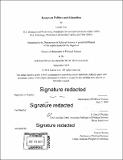Essays on politics and education
Author(s)
Cox Alcaíno, María Loreto.
Download1145016003-MIT.pdf (23.15Mb)
Other Contributors
Massachusetts Institute of Technology. Department of Political Science.
Advisor
F. Daniel Hidalgo.
Terms of use
Metadata
Show full item recordAbstract
This thesis comprises two projects on politics and education. The first one studies the consequences of unmet expectations after higher education in political behavior. It uses a larges ample panel that I designed and implemented in Chile, which follows students in their incorporation to the labor market (14,233 higher education students around graduation time in 2016, and 3,948 of them one year later). I use two different empirical methods. First, a survey experiment (Paper 1): after revealing their labor expectations for one year later, and before answering questions on political behavior, respondents randomly received information on average labor outcomes of past graduates from their same degree and institution. Second, panel methods (Paper 2): I calculate the gap between expected and actual outcomes of higher education at the individual level and estimate the relation between gaps and changes in political behavior. Both methods robustly show that unmet expectations move individuals toward more pro-equality / pro government ideology. I interpret these results as coming from undermined perceptions of social mobility, induced by unmet expectations, in the lines of Picketty (1995) and Alesina and Giuliano (2011). Regarding political position, respondents with unmet expectations, despite moving to the left in ideology, punish the left-wing incumbent government for their misfortune, as in retrospective voting theory. The second project (Paper 3), coauthored with Eyzaguirre, Gallego, and Garcia, studies the electoral effects of providing information on the service provision of incumbent mayors through a randomized intervention in the 2016 local elections in Chile. We sent letters to 128,033 voters informing about performance of local public schools (levels and changes), and we vary the yardstick in each letter (average and maximum performance). Results are different for old electoral booths, where people are older and have a longer electoral history, and new booths, where people are younger and have usually voted in a couple of elections, at most. In old booths, bad relative performance reduces turnout, which translates almost entirely in less support for the incumbent and produces spillovers to the election of local councilors. Results are concentrated in the outcomes in levels and with average performance as the yardstick.
Description
Thesis: Ph. D., Massachusetts Institute of Technology, Department of Political Science, 2019 Cataloged from PDF version of thesis. Includes bibliographical references.
Date issued
2019Department
Massachusetts Institute of Technology. Department of Political SciencePublisher
Massachusetts Institute of Technology
Keywords
Political Science.